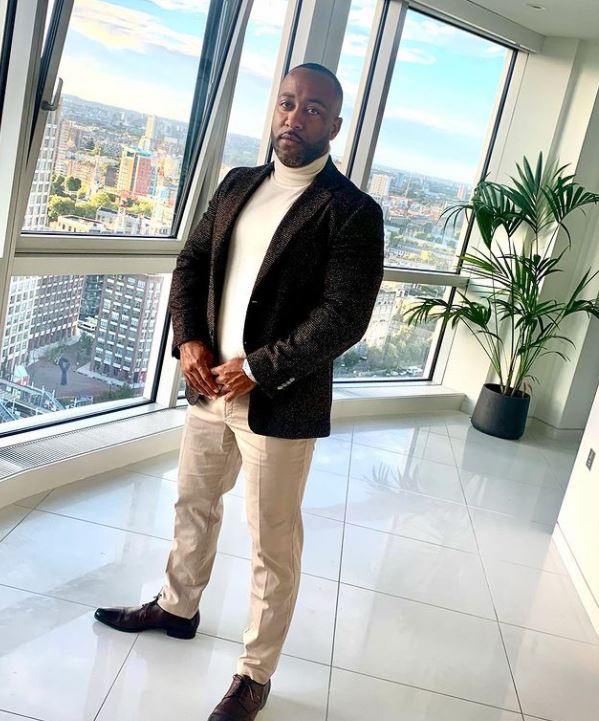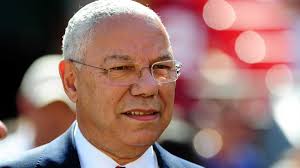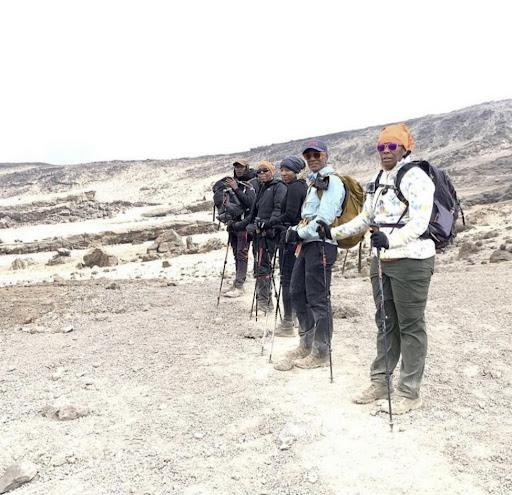|
James Bond has Pinewood Studios, Harry Potter has Warner Bros. Studios – and now an aspiring Black filmmaker hopes to turn a £4million Essex mansion into the next best thing in the film industry.
Antoine Dixon-Bellot may not be a familiar name to some but there’s a reason he’s being dubbed the UK’s Tyler Perry. The successful entrepreneur has bought a stunning estate just outside the East of London where he’s in the process of transforming it into a movie studio lot – think Hollywood or Perry’s very own impressive Tyler Perry Studios in Atlanta. It’s the natural step for a man who has already produced music videos and campaigns for the likes of Stormzy and Little Mix, a commercial film studio, camera lens company whose products have been used in Netflix’s Ozark, and a £15m property portfolio. In 2014, the 39-year-old made the decision to stop directing movies himself and move into producing and his journey has led him to this point, where he’s in the process of developing what promises to be an exciting moment for British TV and filmmaking. Antoine said: ‘Black ownership of the facilities I own in the film industry didn’t exist. Having resilience, my head down and not feeling sorry for myself I think was the key. ‘I was aware of the problems and issues and I wanted to solve them myself. Now being in a position where I can be a platform and opportunity for other up and coming ethnic minority filmmakers – anybody really, whether you be ethnic minority or not, a platform is a platform and I’d like to look at some of my companies as an incubator of talent.’ Noting how ‘tremendously difficult’ it can be for Black talent in the British film industry, Antoine recalled of his own experience: ‘I’ve found it very difficult, not just to open my own doors, but to get opportunities where an entity wouldn’t trust the service for whatever reason, but also having doors closed on us that we didn’t even know were open. ‘An example of that would probably be not winning big jobs, not having a big organisation wanting to do a contract with you.’ Looking to the future, what does one get for a $4m countryside estate? According to Antoine, the property is spread across 52 acres and includes a main Georgian mansion, 14 outbuildings and a small private lake. The businessman has spent the last three months planning and developing the different areas of the land and he’s aiming for ‘presidential standards’. Antoine is particularly excited about the backlot space the estate has, noting: ‘When you have a backlot you can build a castle, you can do Saving Private Ryan. It’s already designed as a shooting location as is, to support any future movies that I intend to make.’ It’s not hard to see then, that Perry is a huge inspiration for the filmmaker. ‘He was self-made and self-driven, obviously he had a vision of representing a market that was underrepresented,’ Antoine explained. ‘He’s gone from strength to strength. We have a similar journey of him making his own content and then as time’s gone on, to have a facility house in order to facilitate these productions and that is the progression I’ve been able to do on a smaller scale. ‘That is a journey I would like to emulate as close as possible.’ His own manor, which doesn’t have a name just yet like Hollywood or Tyler Perry Studios, will be open to all so we may see Tom Cruise shooting Mission: Impossible 27 there in the future. Antoine said: ‘It’ll be open, it’ll be universal. I’m going to always represent the underrepresented and being in the position of where I am, some say I’m the most powerful Black producer in the country because of the facilities that I own single-handedly. I own every company by myself. ‘I will always champion Black people, ethnic minorities and hope to fill the voids that we’ve not been able to bridge across based on people not being able to make the right decisions to give people the opportunities. ‘I will champion that always but it is open to all.’ Source: Metro, 9 Nov 2021 Listening to the comments of those he worked with, we come away with a picture of Colin Powell that is very much aligned with our impressions of him, but more so now that he has died.
A general. A warfighter. A peacemaker. A diplomat. A mentor. Retired admiral James Stavridis spoke of Powell’s sense of civility and grace. Our impression of generals is too often that of bold, brash and take charge. Powell did the latter well, but he did it with a worldview shaped by his background and his service as a frontline combat soldier. No one hates war more than soldiers do, Stravridis said, quoting William Tecumseh Sherman and applying it to Powell. Having seen the cost of war up close and personally in Vietnam, he sought to avoid it. But, if it were inevitable, as seen in the first Gulf War, it must be waged vigorously and with the end in sight. Sadly, no exit strategy was in sight, as Secretary of State in 2003 made a case for war in Iraq because it was believed that Saddam Hussein possessed weapons of mass destruction, at least by the Bush administration. None were found. Powell advised President Bush against the war and later came to regret his role in it and admitted it publicly. “I’m the one who presented it on behalf of the United States to the world,” Powell told Barbara Walters on ABC News, acknowledging that his presentation “will always be a part of my record.” Working the system Fortunately, Powell contributed much more. He was a pragmatist. As a diplomat, Powell understood how governments work and how governance needed to be in place. Powell was a people person. Richard Haass, a friend of more than 40 years who first worked with him at the Pentagon, recalls seeing then Col. Powell make phone calls every morning, something Powell referred to as checking the “trap lines.” Haass explained that Powell was seeking information. Information was a currency Powell could use to understand the bigger picture. And when used appropriately could lead to greater understanding between individuals and even government agencies. “Anybody who becomes a senior officer had better have some political instincts or you’re going to get ground up,” Powell told the New York Times. “We are a political nation. It is not a dirty word.” Powell was proud of being the first Black Chairman of the Joint Chiefs of Staff and the first Black Secretary of State. Quite a leap for the son of immigrants from Jamaica. Yet, as John Meacham noted on Morning Joe, Powell said his race should not matter. What should matter is a commitment to service and the competency to do the job well. A mentor to many There is another side of Powell that amplifies his humanity. Powell was a mentor to many young women and men in the military and State Department. Stravridis recalls that when he was named the NATO Commander, the first person he went to see was Powell, who had once held that position. Stavridis told him to remember to do his job and remind himself that he was not Charlemagne. That is, keep humble and understand you can only do so much as an American general in Europe. Lloyd Austin, the current Secretary of Defense, said, “I lost a tremendous personal friend and mentor. He always made time for me, and I could always go to him with tough issues. He always had great counsel. We will certainly miss him. I feel as if I have a hole in my heart.” Colin Powell—soldier-statesman, mentor-leader—left a leadership legacy to remember. Source: Forbes, 18 Oct 2021 For the first time, a team of all-black women climbed Mount Kilimanjaro, and they're all over 4026/9/2021 The mountain is the highest free-standing mountain in the world! A group of Black women, aged 40+, just made history as the first all-Black American woman team to climb Mount Kilimanjaro. Diana Kinard and Dawn Frazier are the founders of Shades of Favor, a collective that aims to "inspire Black women to embrace their next chapter of growth through travel and shared experiences." The two Georgia women met in 2019 and immediately hit it off. They bonded over their love of life, gratitude for how far they had come, and a desire to keep living boldly. The women realized they were favored to be healthy and have the ability to continue pursuing their life's goals. The idea for the "Shades of Favor" group was born. "We are both grateful that we met, and our friendship grew. Becoming comfortable talking about goals and dreams made us aware of many we shared. It also made us aware that we are at the age [where] we realize that members of our families had stopped saying 'not yet.' After a few messages about Kilimanjaro, we both realized that it was a 'not yet' moment for us both, [and] an idea was born," Frazier told Because Of Them We Can. "We are both grateful that we met, and our friendship grew. Becoming comfortable talking about goals and dreams made us aware of many we shared. It also made us aware that we are at the age [where] we realize that members of our families had stopped saying 'not yet.' After a few messages about Kilimanjaro, we both realized that it was a 'not yet' moment for us both, [and] an idea was born." That feeling of "not yet," led the women to invite others to join them. They formed a group of women, ages 42-77, who would venture on the bucket list journey of a lifetime. While the chaos of the last year deterred some and created setbacks, the women persevered. "To continue to plan and execute our dream trip during a pandemic was a true testament of our faith and belief," Kinard said. Eventually, the group of 20 dwindled to 9, and the women began training to conquer the mountain in Tanzania, the world's highest free-standing mountain. "Every training plan says to be in the best shape of your life. The altitude was an unknown factor, so all efforts were attempts to prepare for the lack of oxygen. Getting used to the weight of the clothing, boots, and backpack was a big part of the training. Then focus on spending time on your feet for consecutive days to prepare for the fatigue," Frazier explained. She continued, "I personally decided to slow things down and spend my training hours in a zone that increased my aerobic fitness. My whole goal is to make my body able to maximize whatever oxygen is available as we get closer to the top. It was tough to slow the walks, runs, and bike rides down, but I found that it kept me from being sore and able to do at least 1.5 to 2 hours each day for about 60 days before I left. Everyone did something different, and that worked for me." Before they knew it, it was time to embark on the journey. Of the nine women, five ended up making it to the mountain's highest peak, Uhuru, which sits at 19,341 feet. Two made it to Stella Point, sitting at 18,885 feet, and one made it to Gilham Point, sitting at 18,652 feet. The journey took about five days, with some days being short and others being long. They started the day just before 3 am and ended around 4 pm, with another 4-hour trek back down to their campsite during their summit push. While the journey was arduous, it was one that they're all very proud of and one they believe was life-changing. "We are all stronger than we think. Your body will want to quit, but your mind will keep you going. This was a lesson in life," Kinard said. The two women credit the group's support with pushing them each on and recommend anyone looking to replicate the trek to find their village, after consulting their doctors first, of course. For the duo, it was not just about the bucket list item but more about proving to themselves and the world that no matter your age, there's always an opportunity to grow. "I do not want people to think this is all about travel. This is about women who will traditionally be a supportive member of someone's village when she should be the supported member of her own village. It's not about where we are going but keeping a growth mentality," Frazier said. Source: Because of Them We Can, 22 Sept 2021 |
Archives
May 2022
Categories |




 RSS Feed
RSS Feed